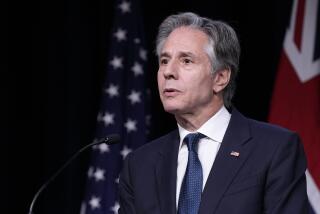Israel to Ease Its Screening of Blacks, Arab-Americans
- Share via
JERUSALEM — A special interdepartmental government committee, convened to look into allegedly discriminatory border-control practices, recommended a series of steps Sunday “to ease conditions” for black and Palestinian American citizens entering Israel, Foreign Ministry spokesman Ehud Gol announced.
The steps, which Gol said are expected to take effect immediately, will not end the practice of special processing for certain individuals or groups but will make their situations during the resulting delays more comfortable.
An American Embassy official said the embassy has not yet received any official communication from the Israeli government about the recommendations and that he will have no comment until it does.
‘Deep Concern’
State Department spokesman Charles Redman said in Washington last week that the United States had expressed its “deep concern to the Israeli government about the discriminatory and arbitrary treatment of some American citizens.”
The department has received at least 75 reports so far this summer of blacks and Arab-Americans who have been refused entry to Israel or who have had to surrender passports or airline tickets or post large cash bonds as guarantees that they would not overstay their tourist visas.
This is the second summer in a row in which Washington has officially protested to Israel over the situation.
This year, the State Department also threatened to issue a travel advisory, warning Americans about Israeli entry procedures. Such a step could reduce American tourism to Israel. But more importantly, it would amount to an unprecedented diplomatic slap in the face to Jerusalem by Washington.
Israel Denies Bias
Israel has repeatedly denied any pattern of discrimination against black Americans or those of Palestinian descent. At the same time, it defends its right to deny entry to people it considers security risks or those who it believes intend to illegally overstay the standard 90 days allowed on tourist visas.
Officials here were clearly taken aback by Redman’s public criticism, however, and also by a personal letter complaining about the situation reportedly sent by U.S. Ambassador Thomas R. Pickering to Israeli Foreign Minister Shimon Peres.
The result was Sunday’s special 90-minute meeting of 15 officials from a number of government departments and organizations, chaired by the Foreign Ministry’s political director general, Yossi Beilin.
Spokesman Gol stressed that the committee’s recommendations came despite the fact that more than 2,000 Americans of Palestinian origin are currently staying “unlawfully” on the Israeli-occupied West Bank of the Jordan River and that these individuals constitute “a grave security problem.”
Black Hebrews an Issue
Some black Americans have had trouble entering Israel because of suspicions that they may be trying to join a group calling itself the Black Hebrews.
Led by a former Chicago bus driver, the Black Hebrews, now numbering an estimated 1,500 refugees from America’s ghettos, have renounced their U.S. citizenship and claim ancestral ties to the Biblical Israelites. Israeli officials consider the group to be an unwelcome cult, and they have announced their desire to deport them.
Gol blamed “hostile elements” for what he termed the “exaggerated” reports of harassment directed at blacks and Palestinian-Americans.
Quoting information presented to the committee, Gol said that only 120 of about 130,000 American citizens entering the country so far this year have experienced problems. Not all of the 120 were black or Arab-descended, he said, although those citizens compose most of the total.
He also said that 20,000 Americans of Palestinian descent enter the country every year and that “only a few of them are facing problems.”
Figure May Be High
Other sources familiar with the issue said the 20,000 figure appears to be high, possibly because it includes entries to the country by Palestinian-Americans who have permanent-resident status on the West Bank and who travel back and forth to Jordan.
The sources also said that while 120 may accurately represent the number of people who have had the most severe problems at the airport or the frontier with Jordan, countless more black and Palestinian-Americans face long delays and harassment before being allowed to enter.
Gol said the interdepartmental committee recommended that:
-- People delayed for more extensive document and other checks be kept in air-conditioned areas, be given food and water and be allowed to contact friends, relatives, a lawyer and American Embassy officials.
-- Airport officials be trained and “briefed in advance to know exactly how to take care of these people.”
-- There be regular contact between the Israeli government and American officials, both on individual cases as they arrive and regarding “the overall issue.”
More to Read
Sign up for Essential California
The most important California stories and recommendations in your inbox every morning.
You may occasionally receive promotional content from the Los Angeles Times.













